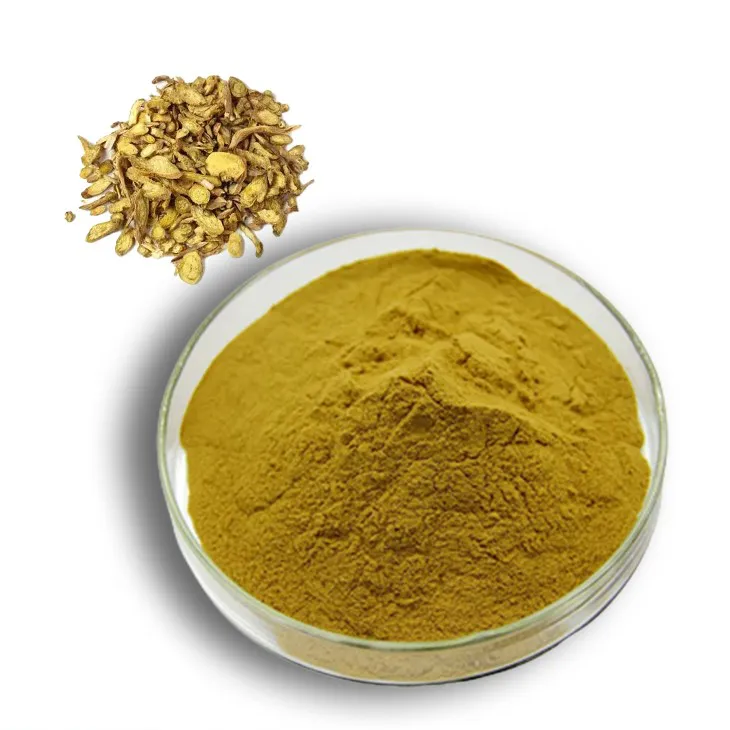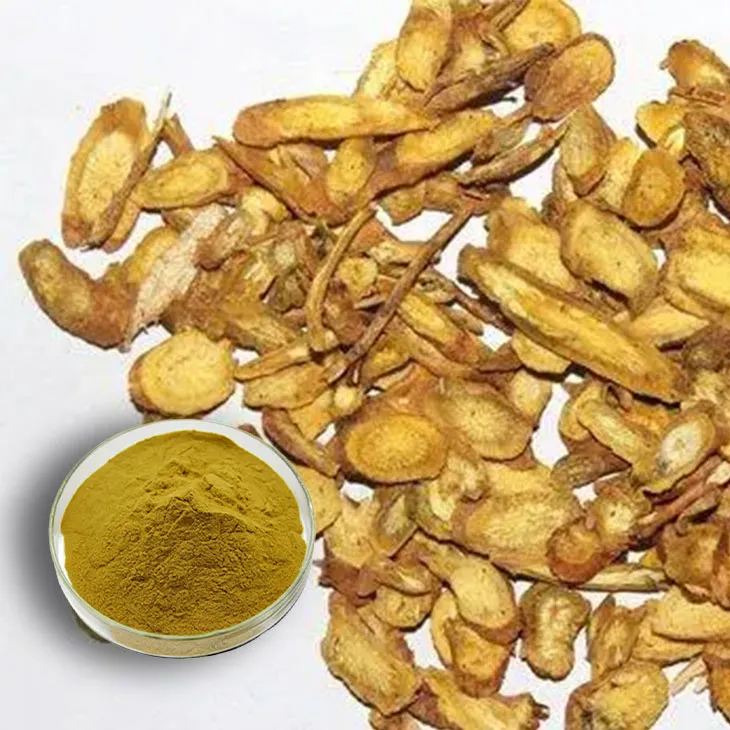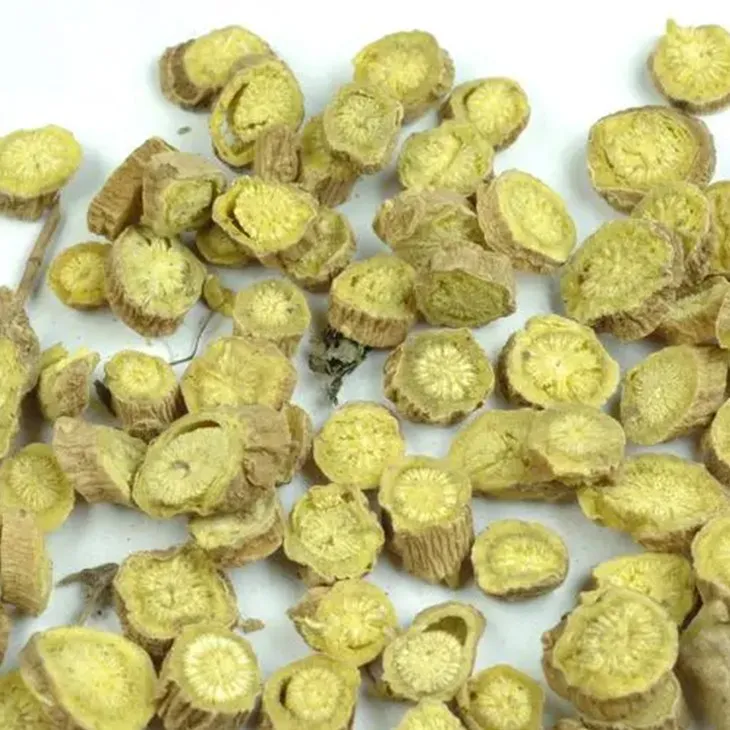- 0086-571-85302990
- sales@greenskybio.com
10 Amazing Health Benefits of Baicalin.
2024-11-13

1. Introduction to Baicalin
Baicalin is a natural compound that has been the focus of numerous scientific studies in recent years. It is derived from the roots of the Scutellaria baicalensis plant, which has been used in traditional Chinese medicine for centuries. Baicalin is known for its diverse range of biological activities and potential health benefits.

2. Antioxidant Properties
One of the most significant health benefits of baicalin is its antioxidant properties. Our bodies are constantly exposed to free radicals, which are unstable molecules that can cause damage to cells and tissues. Free radicals are produced as a by - product of normal metabolic processes, as well as from external sources such as pollution, radiation, and certain chemicals.
Baicalin acts as a powerful antioxidant by combating free radicals and reducing oxidative stress. Oxidative stress has been linked to a wide range of health problems, including heart disease, cancer, neurodegenerative diseases, and aging. By neutralizing free radicals, baicalin helps to protect cells from damage and maintain their normal function.
Studies have shown that baicalin can increase the activity of antioxidant enzymes in the body, such as superoxide dismutase (SOD) and glutathione peroxidase (GSH - Px). These enzymes play a crucial role in the body's antioxidant defense system, helping to break down free radicals and prevent oxidative damage.

3. Anti - Inflammatory Effects
Baicalin also exhibits anti - inflammatory effects, which can be beneficial for relieving various inflammatory conditions. Inflammation is a natural response of the body's immune system to injury or infection, but chronic inflammation can lead to tissue damage and contribute to the development of many diseases.
Baicalin has been shown to inhibit the production of pro - inflammatory cytokines, such as interleukin - 1β (IL - 1β), interleukin - 6 (IL - 6), and tumor necrosis factor - α (TNF - α). These cytokines play a key role in the inflammatory process, and by reducing their production, baicalin can help to dampen the inflammatory response.
Furthermore, baicalin can also modulate the activity of immune cells involved in inflammation, such as macrophages and neutrophils. By regulating the function of these cells, baicalin can help to prevent excessive inflammation and promote tissue repair.

4. Enhancement of Immune Function
Another important health benefit of baicalin is its potential to enhance immune function. The immune system is our body's defense against diseases, and a strong immune system is essential for maintaining good health.
Baicalin has been shown to stimulate the activity of immune cells, such as lymphocytes and natural killer (NK) cells. Lymphocytes play a central role in the adaptive immune response, while NK cells are part of the innate immune system and are responsible for detecting and destroying virus - infected cells and tumor cells.
Moreover, baicalin can also enhance the production of antibodies, which are proteins produced by the immune system in response to foreign antigens. Antibodies play a crucial role in neutralizing pathogens and preventing infections.

5. Anti - Cancer Potential
Baicalin has also shown anti - cancer potential in pre - clinical studies. Cancer is a complex disease characterized by uncontrolled cell growth and proliferation, and current treatment options often have significant side effects.
Baicalin has been shown to inhibit the growth and proliferation of cancer cells in vitro and in vivo. It can induce cell cycle arrest, which means that it can prevent cancer cells from dividing and multiplying. Baicalin can also promote apoptosis, or programmed cell death, in cancer cells, which is a natural mechanism for eliminating abnormal cells.
Furthermore, baicalin may have anti - metastatic properties, which means that it can prevent cancer cells from spreading to other parts of the body. It has been shown to inhibit the migration and invasion of cancer cells, which are key steps in the metastatic process.
6. Neuroprotective Effects
Baicalin may also offer neuroprotective effects, which are beneficial for protecting the nervous system. The nervous system is highly vulnerable to damage from various factors, such as oxidative stress, inflammation, and neurodegenerative diseases.
Baicalin has been shown to protect neurons from oxidative damage and reduce inflammation in the brain. It can also enhance the function of the blood - brain barrier, which is a protective barrier that separates the brain from the bloodstream and prevents harmful substances from entering the brain.
In addition, baicalin may have potential in the treatment of neurodegenerative diseases, such as Alzheimer's disease and Parkinson's disease. Studies have shown that baicalin can reduce the accumulation of amyloid - β plaques in the brain, which are a hallmark of Alzheimer's disease, and protect dopaminergic neurons in the brain, which are affected in Parkinson's disease.
7. Cardiovascular Benefits
Baicalin also has several cardiovascular benefits. The cardiovascular system is responsible for transporting oxygen and nutrients throughout the body and maintaining blood pressure and heart function.
Baicalin has been shown to have anti - hypertensive effects, which means that it can help to lower blood pressure. High blood pressure is a major risk factor for heart disease, stroke, and other cardiovascular problems.
Baicalin can also reduce cholesterol levels in the blood, particularly low - density lipoprotein (LDL) cholesterol, which is often referred to as "bad" cholesterol. High levels of LDL cholesterol can lead to the formation of atherosclerotic plaques in the arteries, which can increase the risk of heart disease.
Furthermore, baicalin may have anti - thrombotic properties, which means that it can prevent blood clots from forming. Blood clots can block blood vessels and cause heart attacks and strokes.
8. Anti - Diabetic Effects
Baicalin has also demonstrated anti - diabetic effects in some studies. Diabetes is a chronic metabolic disorder characterized by high blood sugar levels, and it can lead to a wide range of complications, such as heart disease, kidney disease, and nerve damage.
8.1 Regulation of Blood Glucose
Baicalin can help to regulate blood glucose levels by improving insulin sensitivity. Insulin is a hormone produced by the pancreas that helps to regulate blood sugar levels. In people with diabetes, the body either does not produce enough insulin or is resistant to its effects.
By improving insulin sensitivity, baicalin can help the body to use insulin more effectively and lower blood glucose levels.
8.2 Protection of Pancreatic Beta - Cells
Baicalin may also protect pancreatic beta - cells, which are the cells in the pancreas that produce insulin. In diabetes, pancreatic beta - cells are often damaged or destroyed, leading to a decrease in insulin production.
Studies have shown that baicalin can protect pancreatic beta - cells from oxidative stress and inflammation, which can help to preserve their function and prevent further damage.
9. Anti - Allergic Properties
Baicalin has anti - allergic properties that can be useful in treating allergic reactions. Allergies are an over - reaction of the immune system to harmless substances, such as pollen, dust mites, or certain foods.
Baicalin can inhibit the release of histamine, which is a chemical mediator involved in allergic reactions. Histamine is released by mast cells and basophils in response to allergens, and it causes symptoms such as itching, sneezing, and swelling.
Furthermore, baicalin can also modulate the immune response in allergic reactions, reducing the production of IgE antibodies, which are involved in the allergic response.
10. Anti - Bacterial and Anti - Viral Activity
Baicalin has been shown to have anti - bacterial and anti - viral activity. Infections caused by bacteria and viruses are a major cause of illness and death worldwide.
Baicalin has been shown to inhibit the growth of a wide range of bacteria, including Staphylococcus aureus, Escherichia coli, and Pseudomonas aeruginosa. It can disrupt the bacterial cell membrane and interfere with bacterial metabolism, leading to bacterial death.
Baicalin also has antiviral activity against several viruses, such as influenza virus, herpes simplex virus, and hepatitis B virus. It can inhibit viral replication and entry into host cells, reducing the spread of the virus.
11. Conclusion
In conclusion, baicalin is a natural compound with a wide range of potential health benefits. Its antioxidant, anti - inflammatory, immune - enhancing, anti - cancer, neuroprotective, cardiovascular, anti - diabetic, anti - allergic, anti - bacterial, and anti - viral properties make it a promising candidate for the development of new drugs and nutraceuticals.
However, more research is needed to fully understand the mechanisms of action of baicalin and to determine its safety and efficacy in humans. With further studies, baicalin may play an important role in promoting human health and preventing and treating various diseases.
FAQ:
What is the main source of Baicalin?
Baicalin is mainly sourced from the root of Scutellaria baicalensis Georgi, which is a traditional Chinese medicinal herb. However, it can also be found in some other related plant species in small amounts.
How does Baicalin exert its antioxidant effects?
Baicalin exerts its antioxidant effects by donating electrons to free radicals. Free radicals are unstable molecules that can cause damage to cells and tissues. Baicalin can neutralize these free radicals, preventing them from stealing electrons from other molecules in the body. This helps to reduce oxidative stress and protect cells from damage.
Can Baicalin be used to treat specific inflammatory diseases?
There is evidence suggesting that Baicalin may be beneficial in treating certain inflammatory diseases. For example, in some studies, it has shown potential in relieving symptoms of arthritis and inflammatory bowel disease. However, more research is needed to fully understand its efficacy and safety in treating these diseases, and it should not be used as a sole treatment without medical advice.
How does Baicalin enhance the immune function?
Baicalin may enhance immune function in several ways. It can stimulate the production and activity of immune cells such as macrophages and lymphocytes. Macrophages are important for engulfing and destroying foreign invaders, while lymphocytes play a key role in recognizing and responding to specific antigens. Baicalin can also modulate the production of cytokines, which are signaling molecules that regulate the immune response.
Are there any side effects of taking Baicalin?
While Baicalin is generally considered safe when taken in appropriate amounts, some people may experience side effects. These can include mild gastrointestinal discomfort such as nausea and diarrhea. In rare cases, allergic reactions may occur. It is important to consult a healthcare provider before taking Baicalin supplements, especially if you have pre - existing medical conditions or are taking other medications.
Related literature
- Baicalin: A Review of Its Phytochemistry, Pharmacology, Pharmacokinetics, and Clinical Application"
- "The Antioxidant and Anti - Inflammatory Properties of Baicalin: A Promising Natural Compound for Health"
- "Baicalin and Immune System: Current Understanding and Future Perspectives"
- ▶ Hesperidin
- ▶ Citrus Bioflavonoids
- ▶ Plant Extract
- ▶ lycopene
- ▶ Diosmin
- ▶ Grape seed extract
- ▶ Sea buckthorn Juice Powder
- ▶ Fruit Juice Powder
- ▶ Hops Extract
- ▶ Artichoke Extract
- ▶ Mushroom extract
- ▶ Astaxanthin
- ▶ Green Tea Extract
- ▶ Curcumin
- ▶ Horse Chestnut Extract
- ▶ Other Product
- ▶ Boswellia Serrata Extract
- ▶ Resveratrol
- ▶ Marigold Extract
- ▶ Grape Leaf Extract
- ▶ New Product
- ▶ Aminolevulinic acid
- ▶ Cranberry Extract
- ▶ Red Yeast Rice
- ▶ Red Wine Extract
-
Curcuma Longa Extract/Turmeric extract
2024-11-13
-
Pomegranate Extract
2024-11-13
-
American Ginseng Root Extract
2024-11-13
-
Nutmeg Extract
2024-11-13
-
Saponin Extract
2024-11-13
-
Phyllanthus Emblica Extract
2024-11-13
-
Polygonum multiflorum extract
2024-11-13
-
Boswellia Serrata Extract
2024-11-13
-
Quercetin
2024-11-13
-
Clove Powder
2024-11-13





















